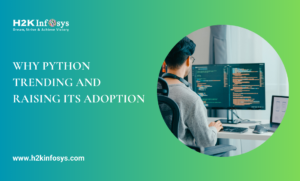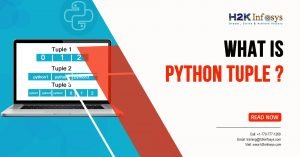If you’re stepping into the world of tech, you’ve likely heard both terms, coding and programming, used interchangeably. Python often comes up in these discussions due to its growing demand and simplicity. But here’s the big question: Is Python coding or programming? The answer is both, and understanding why will help you chart a more focused learning path and a successful career in Python programming.
In this blog, we’ll unpack what Python is, clarify the difference between coding and programming, and explore the essential training paths you need to master this in-demand skill. Whether you’re aiming to enroll in a Python programming training course or want to know what makes the best Python programming course online, we’ve got it all covered.
What Is Python?
Python is a high-level, interpreted language created by Guido van Rossum and released in 1991. Known for its clean syntax and readability, it’s widely used in:
- Web Development
- Data Science
- Artificial Intelligence
- Automation
- Cybersecurity
- Game Development
The beauty of Python lies in its simplicity. It allows beginners to pick up coding quickly while offering advanced capabilities for seasoned developers.
But let’s go back to our core question: Is Python coding or programming?
Coding vs Programming: Understanding the Difference
To answer “Is Python coding or programming?” we must define both terms.
Coding
Coding is the act of translating logic into a language that a machine can understand. In this case, you’re writing Python code that performs specific tasks. Coding is often considered the first step in software development.
Programming
Programming includes coding, but it’s broader. It involves problem-solving, designing algorithms, debugging, testing, and maintaining software. When you write Python to solve a real-world problem, design systems, or build applications, you’re programming.
In summary:
Python coding refers to writing syntax. Python programming involves using logic and structure to develop complete applications.
So, is Python coding or programming? It’s both, but context matters. You start with Python coding and evolve into Python programming as your skills grow.
Why Python Is the Go-To Language for Coding and Programming
Whether you’re coding a simple calculator or programming a machine learning model, Python makes both accessible. Here’s why:
1. Simple Syntax
Python’s syntax closely resembles English, making it easier for beginners to learn. For instance:
pythonCopyEditprint("Hello, World!")
This one line is all it takes to print a message, compared to the longer syntax required in languages like Java or C++.
2. Versatility
Python is used across various domains, web development, data analytics, machine learning, automation, etc. That’s why it’s essential in Python programming training courses.
3. Massive Community Support
With countless libraries and frameworks (like Pandas, Flask, and TensorFlow), Python provides ready-to-use tools for all levels of coding and programming.
4. High Demand in the Job Market
From startups to Fortune 500 companies, Python is everywhere. Pursuing a career in Python programming opens doors to roles like:
- Python Developer
- Data Analyst
- AI Engineer
- Automation Tester
- Web Developer
Real-World Application: When Is Python Coding and When Is It Programming?
Example 1: Python as Coding
You’re writing a script to automate file renaming in a folder.
pythonCopyEditimport os
for i, file in enumerate(os.listdir()):
os.rename(file, f"file_{i}.txt")
This is Python coding. You’re writing a basic script with limited logic.
Example 2: Python as Programming
You build a web application that integrates with a database, uses user authentication, and serves multiple endpoints using Flask.
This is Python programming. It involves design, logic, structure, testing, and debugging.
So, again, is Python coding or programming? It evolves from one to the other as the complexity and scope increase.
Starting Your Python Journey: Why Training Matters
If you’re serious about mastering Python, whether for Python coding or programming, a structured learning path is essential. Enrolling in a reputable Python programming institute will help you:
- Build a strong foundation
- Work on real-time projects
- Get mentorship from experts
- Receive job placement assistance
What to Look for in the Best Python Programming Course Online
Here’s what defines a strong Python programming training course:
- Beginner-Friendly Modules: Clear tutorials, hands-on coding, and gradual difficulty scaling.
- Real-Time Projects: Applying skills in real-world scenarios.
- Career Support: Resume building, interview prep, and job placement.
- Updated Curriculum: Includes AI, ML, web dev, and automation.
- Flexible Learning: Options for online and self-paced formats.
At H2K Infosys, our Python courses combine all these elements to ensure career readiness.
Henry Python: A Popular Search. What Does It Mean?
You might have stumbled upon the term Henry Python while exploring online courses. While the term often refers to unrelated results or platform branding, it has nothing to do with Python itself. So when someone asks, Is Python coding or programming? Don’t get confused by such terms. Focus on quality training from authentic sources instead.
Python Coding or Programming in the Job Market
Here’s how Python is used across popular roles:
| Role | Python as Coding | Python as Programming |
|---|---|---|
| Web Developer | Writing HTML parsers | Building RESTful APIs using Flask or Django |
| Data Analyst | Writing scripts for data extraction | Developing full ETL pipelines |
| QA Automation | Writing test cases | Designing automation frameworks |
| AI Engineer | Using libraries like NumPy | Developing ML models with TensorFlow |
Both coding and programming go hand-in-hand in a career in Python programming.
Hands-On Tips to Advance Your Python Skills
Python coding or programming’s how to move from basic coding to professional programming:
1. Start with Daily Coding
Practice simple scripts, file handling, loops, and functions.
2. Build Projects
Start with calculators or to-do apps and move to web scrapers or dashboards.
3. Read and Debug Code
Understand how others solve problems and practice debugging to improve logic.
4. Enroll in Training
A well-structured Python programming training course will fast-track your progress.
5. Master Libraries
Learn key libraries:
- Web: Flask, Django
- Data: Pandas, NumPy
- Automation: Selenium
- ML: Scikit-learn, TensorFlow
Common Myths Busted: Python Coding vs Programming
Myth 1: Coding Is for Beginners, Programming Is for Experts
Fact: You can be a beginner programmer or an advanced coder. It’s all about the scope of the project.
Myth 2: Python Is Only for Coding
Fact: Python powers full-scale software systems, AI models, and enterprise apps. A programming language.
Myth 3: You Need a Computer Science Degree
Fact: Many successful developers started with no degree but completed the best Python programming course online and practiced consistently.
So, next time someone asks Is Python coding or programming? You know how to answer with confidence.
Conclusion
Is Python coding or programming? It’s both, and more. Python starts with coding syntax but quickly scales into full-fledged programming when you develop complex applications, analyze data, or automate workflows. Whether you aim to become a data analyst, web developer, or automation expert, Python offers you the foundation.
Python coding or programming Kickstart your career in Python programming with H2K Infosys. Enroll in our hands-on course today to gain the skills, confidence, and project experience needed to thrive in today’s tech-driven world.”
Start your Python journey with H2K Infosys, where hands-on learning and real-world skills meet job-ready outcomes. Enroll now and unlock your future in tech!


























